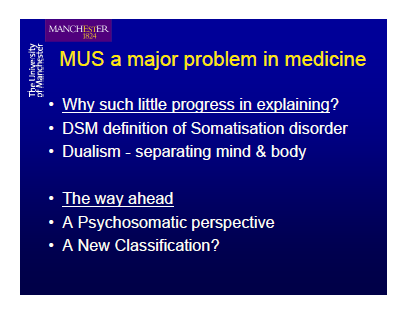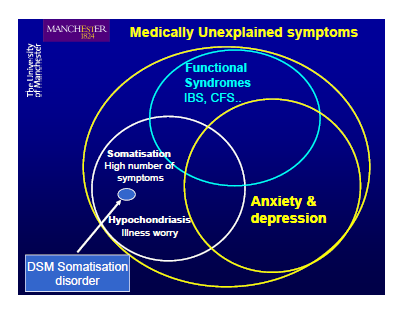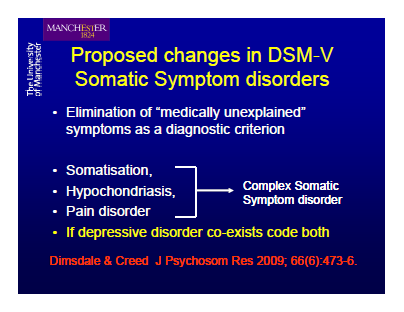Hi
teejkay and
flybro
I will endeavour to keep this response simple but I'm afraid I cannot keep it short.
I contacted Prof Creed yesterday. I asked whether there was a transcript, summary or notes for the lengthy slide presentation he gave at the November meeting of The Academy of Psychosomatic Medicine. Prof Creed says that he is intending to write up a summary and will send me a copy when he has done so. I hope that he will, but it may not be for some time.
I have tried to set out material on my new site as simply as possible. I still have all the CISSD Project material to sift through and add pages for.
My new site:
The URL for my new
Dx Revision Watch site is:
http://dxrevisionwatch.wordpress.com
I have set out what we know so far about DSM
Somatic Symptom Disorders Work Group proposals on this page:
DSM-5 proposals Sub page 1: http://wp.me/PKrrB-hT
I have set out the codings for
PVFS, ME and Chronic fatigue syndrome in ICD-10 on this page:
http://dxrevisionwatch.wordpress.com/icd-11-me-cfs/
Other pages have background to the DSM revision process and the ICD-10 revision.
At the end of
Page 2 of this page:
http://dxrevisionwatch.wordpress.com/icd-11-me-cfs/
I have given links for the current proposals for the
US "Clinical Modification" US-ICD-CM which is due for implementation in
October 2013.
Be aware that there will be some in the US (and elsewhere) who prefer that CFS
is separated from ME in ICD codings.
As I've set out to fresh_eyes,
it is not possible for me to make an informed opinion about the WHO's intentions and I have made no claims about ICD-11.
(In this posting on the original DSM thread at:
http://forums.aboutmecfs.org/showthread.php?1675-APA-moves-DSM-5-Publication-date-to-2013/page4 Post # 34)
We currently have
no indication about any proposals that ICD-11 Revision might be proposing for either Chapter V or Chapter VI of ICD-10 from any ICD Topic Advisory Group Summary Reports and we have no draft yet for ICD-11.
As far as the revision of ICD-10 goes, it is too early to establish what,
if any, changes ICD Revision might be proposing for the three terms of relevance to us.
I am not therefore prepared to make any predictions or assumptions about proposals for ICD-11 and I have made no predictions or assumptions in any of the material that I have published in the last 11 months, either on my sites or elsewhere about ICD-11.
So if you see anywhere on the internet that
"ME agenda" says WHO want to do such and such for ICD-11..." I am being misreported. Please send me the URLs so that I can correct any misreportings.
Make sure people have solid, documented information (or sources for this) - not speculation.
For the US, the 2013 Clinical Modification has more immediate relevance - although the structure of ICD-11 (and that of DSM-V) may have some influence on ICD-10-CM before it is "frozen".
Clinical Modifications:
What you want to avoid is getting into a tangle between ICD-10, ICD-11 and ICD-10-CM.
Remember also that the commitment to striving, as far as possible, for congruency between the two systems is a joint undertaking between the APA and WHO, although WHO acknowledge that there will be areas where it won't be possible to achieve this.
When you are discussing DSM and ICD and codings with others, the first thing you will need to ensure is that they understand that not all countries are currently using ICD-10. They will need to refer to their own Clinical Modification for codings for PVFS, ME or (Benign) ME, and Chronic fatigue syndrome.
By all means refer them to this page:
http://dxrevisionwatch.wordpress.com/icd-11-me-cfs/ if they want information on
current ICD-10 codings.
I will be adding an additional page with links for the various national modifications later this week.
If you are not already confident about the current proposals for the
US CM for October 2013, the URLs are here:
Current proposals for the US Clinical Modification ICD-10-CM, scheduled for implementation in October 2013, propose
classifying Chronic fatigue syndrome at R53.82.
Wikipedia: http://en.wikipedia.org/wiki/History_of_chronic_fatigue_syndrome#ICD-10-CM
For most recent ICD-10-CM proposals see:
CDC site: International Classification of Diseases, Tenth Revision, Clinical Modification (ICD-10-CM)
http://www.cdc.gov/nchs/icd/icd10cm.htm
The 2010 update of ICD-10-CM is now available and replaces the July 2009 version:
http://www.cdc.gov/nchs/icd/icd10cm.htm#10update
----------------------
What should you do?
It depends on how much energy, time and concern you have.
I am UK, as is flybro.
Your perspective of DSM differs from ours in at least three important areas:
1] DSM does not have the same relevance in the UK as it does for the US. We tend to use Chapter V of ICD-10, here. What goes into DSM-V will have a downstream effect on us - literature, research, the conference and symposia circuit. So we in the UK (and Europe and other parts of the globe) are stakeholders in the development of DSM.
2] In the UK we are looking towards ICD-11. In the US you are looking towards implementation of ICD-10-CM - with a different proposed coding for Chronic fatigue syndrome than in ICD-10 (or in ICD-10-CA, the Canadian modification, which has all three terms at G93.3).
3] In the US, your health care system and welfare system is quite different to ours.
Given these differences, trying to cover all bases, simultaneously, for both the UK and US perspective, is way too complex - and the issues are already complex, enough.
This is why I suggested splitting the thread into two, several weeks ago - one for DSM and ICD-10 users, and one for DSM and the US version of ICD.
Having researched and worked on this (and related) issues for almost a year, I most likely have more information about the DSM and ICD revisions on my sites and on my hard drive than anyone else and I am happy to make any information I hold available to others.
But I don't own this issue.
There are thousands of ME and CFS sufferers in the US.
There are now
1,110 members on Cort's forums.
That's a sizeable forum. Co-Cure has maybe around the same number of recipients signed up for its mailing list. But Co-Cure isn't a discussion board.
Dan Moricoli's network is popular and I would imagine his network has a high percentage of US users. He has forums, blogs and information resources. He also networks with "names".
Facebook has dozens of CFS and ME related groups. It's useful for spreading the word, getting folks to sign up to petitions etc. But I don't find it a good place to carry out discussions. You cannot format posts, you cannot edit posts after 15 mins, it's hard to find stuff from weeks back. It's hard to keep track of where information (or misinformation) is being republished (or to correct it, if you need to keep joining pages in order to leave comments.)
In fact I hate Facebook. I live in dread of a PM inadvertently ending up on someone's Wall or to find that I have sent someone a puppy, or a pair of fluffy handcuffs, instead.
Be aware that the zeitgeist in some quarters may be that
"XMRV will change / has already changed the landscape" and that DSM is now irrelevant and why are you bothering monitoring all this DSM and ICD stuff...
Since October, the focus for many has understandably been on XMRV, but other issues are still worthy of attention.
Yes, DSM has global implications, but you need to be looking for direction from within the US from people better equipped than I am with a thorough understanding of your own medical and welfare systems and fed agencies, and who are knowledgeable about your CFS and ME patient organisations and around your US patient organisation politics.
There will be a DSM draft, then field trials, then a beta draft, and no doubt a lot of argy bargy in between, especially since the APA is also looking into the concept of scrapping categories in favour of "dimensions" - this thing could run and run...
But the first draft is expected on 10 February. I am not necessarily expecting it to be particularly detailed for the section of relevance to us.
That's not long, and the consultation process may be only a couple of months - possibly three, if we are lucky. All the relevant information about the consultation process will be up on my site as soon as it is available.
What I would suggest you might do is this:
Try and gather a few interested US folk around you in the next week or so who are prepared to commit to sharing the load. Put out a plea on this thread or hop onto some of the most active threads on this list and ask for help there, or start a new thread just to garner assistance and then come back to this thread.
Fresh_eyes has said that she was interested in setting up a website for the issue - I don't know what fresh's current plans are - but talk to fresh.
Initially, try and gather three of four around you (any more and it can be hard keeping everyone in the loop and a pig with two masters never gets fed).
Approach US advocates: talk to Cort - what's Cort being doing around DSM and ICD-10-CM in the past couple of years? Sign up to Dan Moricoli's network and see who is posting on the blogs there:
John Herd; Mary Schweitzer; Kaly Castle. Contact seasoned US advocates, like Co-Cure mailers Jill McLaughlin and Jean Harrison (MAME).
Approach your US advocacy organisations and ask them to set out:
What is their position on current proposals for your ICD-10-CM and what action are they engaged in?
Are they are monitoring the DSM revision process?
Are they intending to respond in the consultation process?
The consultation process might possibly be subject to certain requirements, like the format and the citing of research papers.
I am not saying that patients should not be involved in the consultation process but your advocacy orgs and your clinical and research professionals need to involve themselves, too.
Contact Lenny Jason and Fred Friedberg, they should know who the CFS friendly professionals are who might be encouraged to get involved in the consultation process.
So my advice is, as time is fairly tight, don't spend weeks preaching to the choir on Facebook but gather around you a few US people and talk to US advocates who are already involved in campaigning; try to get professionals involved and establish what your US patient orgs are doing.
Suzy



